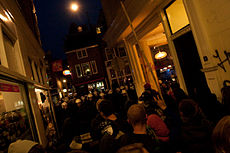- Dutch squatting ban
-
Dutch squatting ban  Protesters confront police in Amsterdam over the squatting ban
Protesters confront police in Amsterdam over the squatting banDate October 1, 2010 Location Amsterdam, other cities in the Netherlands On 1 October 2010, squatting became de jure illegal in the Netherlands. Riots in Amsterdam and Nijmegen, and several protests followed. Squatters converged, occupying a former fire station.[1]
The recently elected coalition government proposed a squatting ban on 1 June. The law was passed by both houses of parliament and came into force on 1 October. Former moves to ban squatting had been unsuccessful. In June 2006, ministers Sybilla Dekker and Piet Hein Donner from the Dutch government proposed a plan to criminalise squatting.[2][3] Other ministers, such as Alexander Pechtold, were not in favour. Representatives of the four largest Dutch cities wrote a letter stating that it would not be in their interests to proceed with a ban.[4] Squatters nationwide made banners, hanging them on their squats in protest.[5] On October 28, 2011, the Supreme Court of the Netherlands decided that the legally forced end of squatting can only occur after an intervention of a judge.
Contents
History
Riot-police charging protesters (original size version)Origins
Dutch squatting has its origins in the 1960s when the Netherlands was suffering a housing shortage while many properties stood empty. Property owners kept buildings empty in order to speculate and drive the market price upwards.[6] Squatting was seen as an anti-speculation political move, rather than a practical one. Property owners often failed to repair buildings in the hope of obtaining demolition permits.[6] Squatting gained legal status under a landmark Supreme Court ruling that the concept of domestic peace (huisvrede, requiring permission from the current occupant to enter a building) also applied to squatters just as to any other occcupant. This meant that property owners could only evict squatters by taking them to court.[7]
The squatting movement took on an increasingly anarchist tone during the 1980s. On 29 February, police moved to evict residents from a squatted building on the corner of Vondelstraat. It was immediately reoccupied and barricades erected. Street fights ensued between riot police and the squatters, with the building being cleared when a military tank demolished the surrounding street barricades.[6] Queen Beatrix's investiture later that year was marred by rioting after squatters chanted "Geen woning, geen kroning" - No home, no coronation in the preceding months (although Dutch monarchs are not in fact crowned).[6][7]
Move to ban squatting
Several parties, notably the VVD party, were vocal critics of squatting. Backed by the leader of the PVV, Geert Wilders they moved to outlaw squatting.[7] The new squatting ban was passed by the House of Representatives on 15 October 2009 and the Senate on 1 June 2010, and became law on 1 October 2010. The penalty is one year's imprisonment, or more if violence is involved.[8] The mayor of Amsterdam, Eberhard van der Laan, and police commissioner Leen Schaap stated their intention to clear roughly 200 of 300 squats in Amsterdam, and to treat squatting as a criminal offence.[6][9][10]
Reaction
In the run-up to the ban, there was an overnight sit-in at Dam Square on 25 September.[11] A former fire station was occupied next day,[12][13] but the building was handed back to its tenants before the squatting ban came into effect on 1 October.[14]
Squatting became a criminal offence at midnight on 1 October 2010, passing from the civil courts to the criminal courts. An Amsterdam protest numbering 800–1000 by various estimates occurred during the day.[7][10][15] By nightfall police charged protesters initiating violence.[16][17] Protesters responded throwing stones, bricks and bottles at police and vandalising cars. Protesters built ad hoc street barricades from metal fences and bicycles[8][18] to repel police charges in armoured vans and on horseback.[16] The police response included the use of bulldozers and water cannons to clear streets and extinguish fires.[7] Another protest occurred the next day in Nijmegen.[19] Police dispersed the protest by force and closed down the central station, arresting protesters present.[16] In Amsterdam that same evening, the police station was attacked by Molotov cocktails. The mayor, Eberhard van der Laan appeared on television, calling for calm and claiming the unrest was due to a hard core of 150 people. Police commissioner Leen Schaap restated his intention to enforce the law, deploying riot police around the city and sending a contingent to evict a squatted house in the centre owned by ING Bank that turned out to be empty.[10][20]
References
- ^ Kraakmeer @ Weesperzijde 99, Amsterdam
- ^ Kraken wordt strafbaar
- ^ Letter to Minister Dekker from four main cities
- ^ Grote steden tegen verbod op kraken
- ^ Landelijke spandoekenaktie kraakverbod
- ^ a b c d e DutchAmsterdam.nl - Squatting in Amsterdam
- ^ a b c d e MSNBC Violent protests after Dutch outlaw squatting - Once-respected tradition of living in unused buildings is now a crime
- ^ a b BBC News report on squatter protests
- ^ n-1.cc blog post - Anti squatting ban demos in the Netherlands by bocaextra
- ^ a b c squat!net: events in Amsterdam
- ^ Indymedia.NL Dam Sleeping Action
- ^ Indymedia.NL Am*dam Social center squatted - days of action continue!
- ^ whatever.squat.net Weesperzijde 99
- ^ Indymedia.NL A * dam Squatters leave former fire station
- ^ UK Indymedia - Riots in Amsterdam against the squatting ban
- ^ a b c Kraakverbod - report of events
- ^ at5 news kraak protest
- ^ "Squatters riot in Amsterdam". Stuff.co.nz. 2 October 2010. http://www.stuff.co.nz/world/europe/4191477/Squatters-riot-in-Amsterdam. Retrieved 29 September 2011.
- ^ Indymedia.NL - Demonstratie; "NOOD KRAAKT WET", 2 oktober Nijmegen
- ^ Squat Evictions In Amsterdam
External links
Categories:- Squatting
- Housing in the Netherlands
Wikimedia Foundation. 2010.

